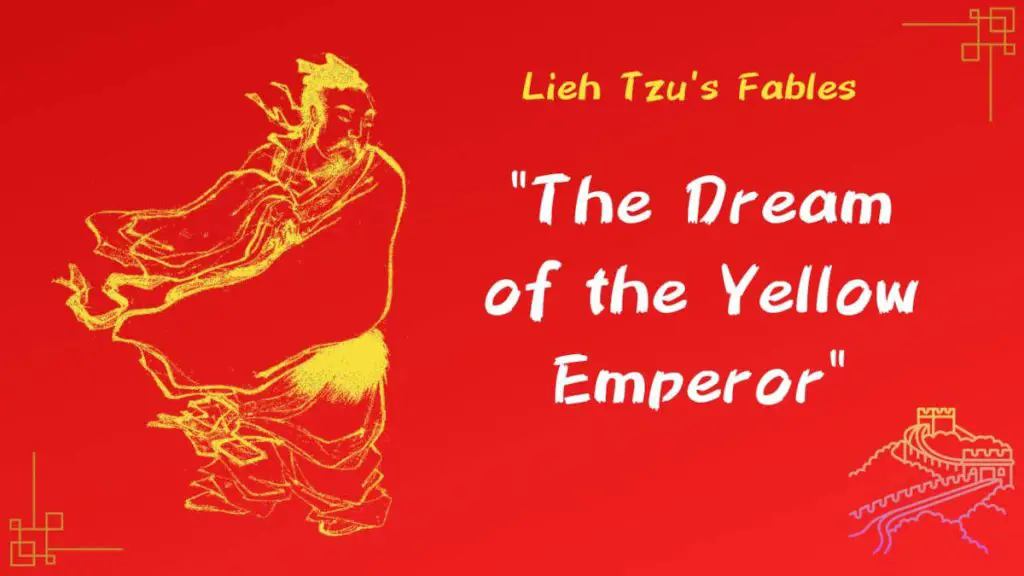The stories of great emperors are frequently rich in insights and teachings that transcend time in the history of ancient China’s wisdom. One of these stories is the Yellow Emperor fable by Lieh Tzu, about an emperor whose journey from self-indulgence to self-discovery reveals the real meaning of contentment and the way to effective leadership.
This fable is from Henry Balfour’s 1887 book “Leaves From My Chinese Scrapbook.” If you want to read it, there is a link at the bottom of this article. Let’s read this fable.
The Fable of “The Yellow Emperor”
The Yellow Emperor had the affection of the whole empire over the first fifteen years of his rule. As a result, he lived life to the fullest and indulged his senses, but with time, his skin began to shrivel, his appearance turned sallow, his intellect became foggy, and his passions went out of control. He had reason to be sad about what was happening in his kingdom throughout the following fifteen years of his reign, and he used all of his mental faculties, as well as all of his strength and intelligence, to care for the populace.
However, his personal health and appearance remained in being as poor as they had always been. The Yellow Emperor finally sighed and said, “My faults are indeed excessive! To think that all this trouble started because I cared too much about myself and now because I tried to help my people!”
After that, he gave up on every facet of government, left his imperial harem, fired his guards and eunuchs, took down the frame from which his bells hung, retrenched his table, and quit into a quiet area in the grand court of his palace. There, he purified himself and wore sad-colored robes while not participating in governmental affairs for three months.
One day, he fell asleep and dreamt. He thought he had gone as far as the State of Hua-hsü, which is a very distant place. He didn’t know how far away from home he was in terms of thousand myriads of li, but neither carts nor boats had ever been able to travel this far. Obviously, it was only his spirit that was wandering.
There was neither a general nor an emperor in this state; instead, everything occurred of its own accord. The population had no feelings or preferences, and spontaneity ruled supreme. They had no concept of the pleasures of life or the horrors of death, so no one passed away before their time. They had no concept of loving oneself and avoiding those who were not related to them, so there was no affection or hatred among them. They had no concept of disobedience on the one hand and obedience on the other, so benefits and harms were equally unheard of.
There was nothing they treasured or dreaded, nothing they avoided at all costs; if they fell into the water, they did not drown; if they fell into the fire, they did not burn; if they were cut or hit, they felt no pain; if they were scraped by fingernails, they did not itch. They rode through space like they were walking on solid ground, and they lay down in empty space like they were on a couch. Clouds and mist didn’t block their vision, thunderclaps didn’t bother their hearing, beauty, and repulsiveness didn’t upset their minds, and mountains and valleys didn’t stop their steps. Their spirits were no longer in motion.
The Emperor eventually awoke, at which point he realized everything. “We have now lived in retirement for three months, cleansing our hearts, and wearing mourning clothes,” he yelled at his three ministers. “We have considered the finest ways to look after ourselves and dominate others, but we haven’t discovered the key. Exhausted, we slept off and dreamed.” The Emperor then elaborated on his dream. “Now that we understand the perfect way, we can’t waste our time looking for it anymore. We know it, we have it, but we can’t give it to you.”
The empire was at peace, almost like the State of Hua-hsü, after another twenty-eight years. Finally, the Emperor passed to the Distant Land, and for nearly 200 years, the people never stopped crying over his departure.
Do you enjoy Chinese fables? Click here for more – Opens in new tab.
End Words
The Yellow Emperor’s fable has a profound moral about leadership, self-knowledge, and the search for lasting happiness. The Emperor’s early pursuit of personal pleasures brought him to the edge of bodily and mental collapse.
However, he began a path of profound enlightenment after an introspective retreat and the interpretation of a dream. The dream, which takes place in the peaceful State of Hua-hsü, emphasizes the idea of wu wei, or the practice of effortless action and adherence to the natural order. This idea is different from how the Emperor used to try to control and handle every detail of his kingdom.
In the end, the Emperor’s quest for inner knowledge enabled him to let go of the craving for total dominance, resulting in a period of tranquility and exceptional leadership. His legacy is a tribute to the transformational potential of dream interpretation, humility, and knowledge of one’s own ego.
You can click and download Henry Balfour’s book “Leaves From My Chinese Scrapbook” (1887) or visit our free Chinese culture library to find it among many more books.
Stay in Touch
 Join our newsletter by using the forms on this website or click here!
Join our newsletter by using the forms on this website or click here! Follow us on Google News
Follow us on Google News Follow us on Facebook
Follow us on Facebook





